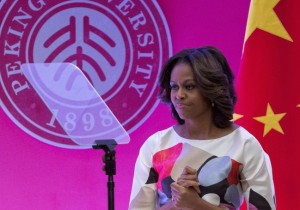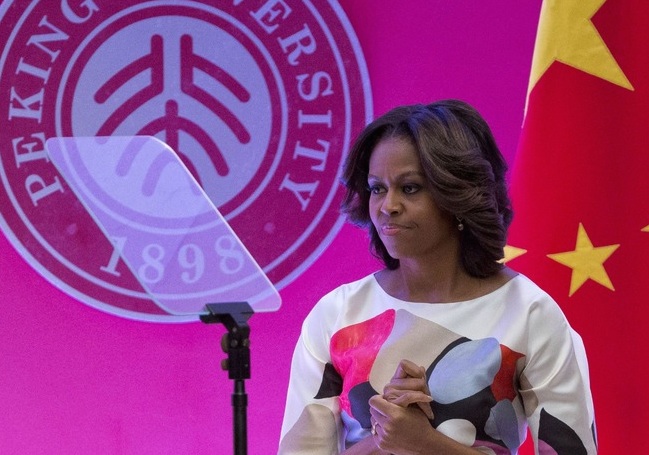 The first lady should aim her ire a little closer to home. The first lady should be informing her husband about the merits of Internet freedom.
The first lady should aim her ire a little closer to home. The first lady should be informing her husband about the merits of Internet freedom.
by Peter Roff
First lady Michelle Obama went all the way to China to lecture the Chinese on the need for free and open access to the Internet, going so far as to declare it a “universal right.” As the U.K.’s Guardian newspaper reported Saturday, Obama told a crowd of about 200 students mostly from the United States that “it is so important for information and ideas to flow freely over the internet and through the media. My husband and I are on the receiving end of plenty of questioning and criticism from our media and our fellow citizens, and it’s not always easy. But I wouldn’t trade it for anything in the world.”
Obama went on to say that, “When it comes to expressing yourself freely, and worshipping as you choose, and having open access to information – we believe those are universal rights that are the birthright of every person on this planet.”
Unfortunately, she was talking to the wrong people. Not because her audience was not composed of those who could influence the behavior of the Chinese government (being mostly from the United States), but because the person who most needs to hear that message right now is her husband.
Up to now, when it has come to the Internet the United States has been the single best guardian of ideals like freedom of access and freedom of speech. It’s not because America wields a heavy hand in the governance of the ‘net – in fact our approach is entirely benign – but because its evolution as a global hub for information exchange, commerce and news springs directly from things Americans value, such as freedom, intellectual curiosity, the rights of individual conscience and the need for the protection of both real and intellectual property.
Not every country sees things in the same way, which is why Michelle Obama might have felt compelled to say what she did. Unfortunately, at virtually the same time her husband’s administration was busy announcing that, as of 2015, the United States would be relinquishing control of the Internet’s essential naming and addressing functions to the private company it created to manage Internet governance issues on a multistakeholder model.
By giving up this essential function to ICANN — the Internet Corporation for Assigned Names and Numbers — which has aspirations to relocate from its California headquarters to some international metropolis like Geneva or Singapore or Istanbul and become a global power of its own – the United States is taking the very great risk that Russia, the EU, the United Nations, what used to called the bloc of non-aligned nations or yes, even China, will achieve the ability to fundamentally alter the culture of the Internet and close it off to much of the world.
If you think other countries are not already maneuvering to take advantage of the change, think again. It was recently announced that Chinese President Xi Jinping will head his nation’s new “central internet security and informatization leading group.” The Want China Times, a Taiwanese publication reported in late February that “the group is designed to lead and coordinate internet security and informatization work among different sectors, as well as draft national strategies, development plans and major policies in this field.”
Xi called for “innovative methods to spread mainstream values and stimulate positive energy while maintaining proper guidance of online opinions in terms of timing, intensity and impact,” the site reported, while quoting him as saying, “Cyberspace should be made clean and chipper … No internet safety means no national security. No informatization means no modernization.”
What he means by “Internet safety” is anybody’s guess, but it is not unreasonable to presume that includes limits on access to sites that take positions antithetical to those held by the government in Beijing or perhaps even just reports on them.
Even in the multi-stakeholder model that ICANN President Fadi Chehade likes to talk about as the new mode for Internet governance there is no guarantee that the Internet will remain as open as it is today. The only thing that guarantees that is for the United States, through the Department of Commerce’s National Telecommunications and Information Administration, to keep control of the keys to the Internet, the very function that it announced it would be giving up.
According to a recent Rasmussen poll of likely voters, 61 percent were opposed outright to the U.S. giving up its last remaining control over the Internet, while another 21 percent were unsure of the wisdom of turning it over to an international organization. “Most voters,” the polling firm said, “think that’s a bad idea and expect countries like Russia and China to try to censor Internet content.”
What the Obama administration is proposing to do is a politically unpopular position, which makes it something of a surprise it would stake out a leadership role on something to which the American people are so strongly opposed. The president’s approval numbers are down consistently and a number of forecasters are now predicting the GOP will take control of the U.S. Senate in the upcoming election. Compromising the idea of freedom of access to the Internet, which strikes at the very heart of the things the key voter bloc of millennials hold dear, seems to be putting one more nail in Obama’s political coffin. How many Senate Democrats is he willing to drag down with him?
. . . . . . . . . . . . . . . .
Peter Roff is a contributing editor at U.S. News & World Report. Formerly a senior political writer for United Press International, he’s now affiliated with Frontiers of Freedom. Follow him on Twitter @PeterRoff.
